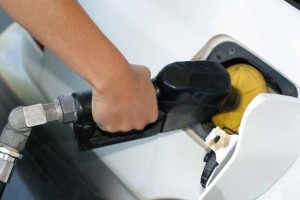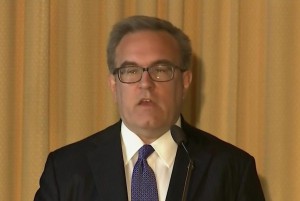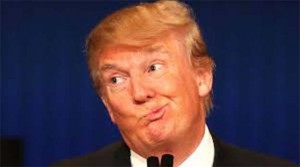
The Trump Administration claimed that cutting the mileage standards would save lives, but internal EPA e-mails show the opposite to be true.
When the White House announced plans to rollback Obama-era fuel economy standards earlier this month, administration officials claimed the move would lead to a reduction in U.S. roadway fatalities. But senior staffers at the Environmental Protection Agency actually warned that quite the opposite was likely, and that the regulatory changes would increase highway deaths.
Internal e-mails sent by EPA officials to the Office of Management and Budget, or OMB, raise new questions about the plans to freeze the Corporate Average Fuel Economy, or CAFE, standards at 2020 levels, well short of the 54.5 mpg target that was to be phased in through 2025. And the messages appear to give new ammunition to those attempting to block the rollback in court.
The “proposed standards are detrimental to safety, rather than beneficial,” William Charmley, the director of the EPA’s assessments and standards division wrote to the OMB on June 18, the interagency e-mail indicating highway fatalities could be expected to increase by 17 annually.
(For the complete story on what the CAFE changes include, Click Here.)
That’s a significant difference from the statements made by Trump administration officials during an August 2 news conference. The rollback was estimated to save up to 1,000 lives annually, according to Heidi King, the deputy administrator of the National Highway Traffic Safety Administration which is jointly charged, along with the EPA, in setting federal mileage standards.
That claim came under immediate fire considering the logic used to determine that forecast. The administration estimated that by boosting fuel economy Americans would drive more and, as a result, there would be more crashes, injuries and fatalities.
Asked about the contrasting forecast by career EPA analysts, the agency’s spokesman John Konkus told the Associated Press that, “These emails are but a fraction of the robust dialogue that occurred during interagency deliberations for the proposed rule.”
The safety claims are one of the key elements of the Trump Administration’s decision to freeze mileage regulations at 2020 levels – which would mean something in the low 30 mpg range in real-world driving. With adjustments and credits, the 2025 standard set by the Obama Administration would work out to something in the low to mid-40 mpg range.
White House officials also justified rolling back CAFE by arguing that higher costs would slow down new car sales and mean that it would take longer to get cleaner, safer vehicles into the hands of the public. But that argument was also refuted as a miscalculation in the e-mails sent to the OMB.

Acting EPA Administrator Andrew Wheeler argues that the CAFE changes will get cleaner, safer cars onto the road faster than under the Obama rules.
Critics of the move contend that under former Trump EPA chief Scott Pruitt and his successor, Acting Administrator Andrew Wheeler, the focus was on making the data fit the plan, rather than the other way around.
“EPA career staff were totally ignored, despite DOT trying to deceive the public into thinking that EPA supports the analysis,” former EPA senior staffer, Jeff Alson told the AP, referring to the Department of Transportation, the cabinet agency that oversees NHTSA.
DOT officials also tried to downplay the release of the internal documents. Meanwhile, administration officials have noted that the rollback announced this month is actually just the preferred of several different options that will now face public hearings. A final decision by the White House is still months away.
And, even then, it is far from clear when – indeed, if – any change will eventually be made to the 2025 Obama-era mileage rules.
The White House already is facing a number of legal challenges, including a lawsuit filed by 19 states and the District of Columbia aimed at preserving the 54.5 mpg target.
Opponents also want to prevent the White House from lifting the waiver granted the State of California to set its own, typically even tougher, standards for CO2 emissions. As carbon dioxide levels are directly proportional to fuel consumption, California can set even tougher mandates, and it has enacted specific sales targets for battery-cars and other zero-emissions vehicles. Those rules have been copied by 10 other states that account for a third of the new vehicles sold in the U.S.
“We are prepared to go to court to put the brakes on this reckless and illegal plan,” the coalition of states attorneys-general, led by Massachusetts Attorney General Maura Healey, said shortly after the EPA/NHTSA plan was announced.
(For more on that lawsuit, Click Here.)
Even before the EPA-OMB e-mails were publicly revealed, some experts were warning the White House would face a tough battle.
It “is going to have to justify to a court why it’s changing its position, because the rule was put in place after a robust administrative process and record” showed its benefits, Cara Horowitz, co-director of the Emmett Institute on Climate Change and the Environment at the UCLA School of law, told trade publication Automotive News. “It’s often harder to justify a changing of a position than the taking of a position, because you have to overcome the presumption that the rule was right in the first place.”
Complicating the case for the administration, the auto industry has been cool to the new CAFE plan. Several industry trade groups have offered cautious support, but industry officials have individually raised concerns. Ford Motor Co. CEO Jim Hackett and Chairman Bill Ford have publicly stated their support for retaining the original federal mileage rules, as have several other manufacturers.
If there is anything in the White House plan that appeals to the industry it is getting federal and California regulators to agree on a single standard, noted a senior official with one of the major Japanese automakers, talking on background to TheDetroitBureau.com.
(Automakers caught in legal limbo by battle over CAFE. Click Here for more.)
If anything, the executive added, the legal battle over CAFE threatens to “complicate” the situation for the industry, making it “difficult” to know how to proceed.
While officials with several carmakers said they are analyzing their options, they will have to move ahead based on the assumption that the courts will block the rollback. Even if the Trump mileage cutback is upheld, added one executive with a domestic automaker, it could come so close to the 2020 election that the industry would want to wait, anyway, to see who would next enter the White House. A Democratic president, he said, would likely reinstate the original Obama rules.



The argument by the EPA defies common sense. It is well known that lightening cars and making them more expensive – a natural consequence of increasing fuel efficiency – will result in more highway deaths. No spin will change that. Now, is the effort to reduce carbon dioxide emissions through increased fuel efficiency above 2020 levels “worth it”? I say no…
Lightening cars no longer has to be considered more expensive, Craig. In fact, in many cases adding weight adds to cost because it can translate into sloppy engineering. New versions of steel and alternative materials can add cost, but that is not a 100% accurate correlation anymore. Reducing the mass of a vehicle, particularly when it comes to body and chassis, allows secondary lightweighting, ie downsizing suspension and other components, as well as opting for smaller powertrains, further reducing weight AND, in many cases, cost, while also improving fuel economy. Those newer metals, meanwhile, often prove far more structurally solid, or contribute to better designs incorporating safety functionality, such as the ability to better channel crash forces. A good example is the use of “tailored blanks”. Mazda’s Skyactiv targets an assortment of ways to trim mass with little or no negative benefit, starting with things as small as lug nuts and water pumps. Cadillac introduced scalloped sheet metal in key areas on models like the CTS and ATS which also have mostly positive benefits with little to no additional cost.
While there’s no solid rule, lightweighting can translate into not only lower mass but higher mileage and lower fuel bills.
Now, this is just one element of meeting the 2025 standard but the lightweighting push has actually resulted in better vehicle designs that are routinely safer than the products being replaced. And crash data backs that up pretty much across the board.
Paul E.
Still failed to detail how they are wrong.
The internal documents largely have. Meanwhile, the prediction of increased deaths due to driving more miles in more fuel efficient cars has been roundly rejected, even by those who want some changes to CAFE rules. Simply far too much of a stretch to make the absurd leap of logic that we can’t boost mileage because people will drive more and crash. Just desperate false projections.
Paul E.